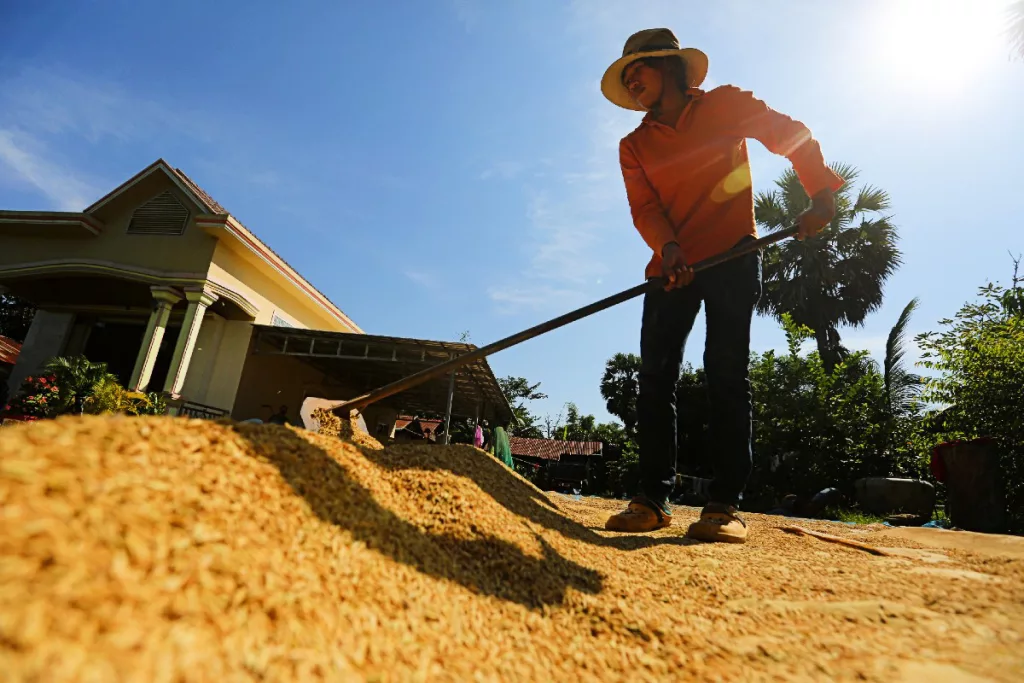Asian Development Bank: Decarbonisation ‘Won’t Work Unless it’s Equitable’
The transition to global net zero to address climate change must be both ambitious and fair. Otherwise, it will fail to achieve its goals — and lack the vital public support required over the long-term.

Farmers, and those working outdoors, are particularly vulnerable to the effects of climate change. Photo: ADB
Although ambitious decarbonisation will provide widespread benefits across Asia, the policies required to make the transition will create winners and losers.
Reaching Paris Agreement goals will require profound changes in the energy sector, including the phasing-out of fossil fuels from power generation, expansion of renewables, and the substitution of electricity for other types of energy. It will require carbon sinks — principally forests — to sequester carbon to offset emissions that are difficult to eliminate.
Although these changes can increase employment, some energy sector workers will lose their jobs, primarily in fossil fuel extraction such as coal mining. The prices of fossil fuel-based energy will increase, and so will the price of goods and services produced using such energy.
Expanding areas of forests and bioenergy would require agricultural production in smaller areas, which may put pressure on farmers. Our analysis finds that about 22 percent of the area devoted to cereal crops in Asia’s developing countries may be replaced by energy crops and forests.
Reductions in cultivated areas can, in turn, reduce food production and cause prices to rise. Research finds that around 60 million people could be pushed into hunger in Asia by 2050 due to efforts to meet Paris Agreement goals.
Those on low incomes spend a much higher share of their budget on food, which will become more expensive. In many regions of Asia, lower-income households spend more on energy than richer ones, so increases in residential energy costs are also regressive.
But failure to mitigate emissions would also have regressive effects. The lowest income areas will bear the brunt of climate impacts, with more than a third of GDP at risk to climate change under a conservative and partial estimate. In Asia, those who stand to lose the most are those with the least income, often working in agriculture, living in areas vulnerable to the effects of storms and flooding, and doing manual labour in hot conditions.
For lower carbon level to be maintained long-term, climate-change mitigation policies must preserve political support. Recent research has found that measures such as carbon pricing are most politically acceptable in the presence of generous social insurance and low inequality. Decarbonisation policies may lead to political backlash and reversal when effects are regressive or lack compensation for the poor.
A major stumbling block in international climate policy negotiations is the perception of whether the distribution of costs among countries is fair. To ensure that it is, we recommend training and reskilling to help integrate those adversely affected by the transition into growth industries. The jobs created will require new skills, and will often be urban and comparatively higher skilled. The workers who lose employment are unlikely to fill new labour demands. Those made redundant will need to be reskilled, while the education system will need to generate the training needed by the renewables industry.
Labour markets can be supported by public services to help information flow, and reforms can ensure that barriers to improvement are removed. During the transition, social protection, including unemployment benefits, are needed so that workers can smoothly transition to new opportunities.
A fair transition depends on ensuring food security. Food is the single largest household expense among lower-income households in Asia’s developing countries. Equipping Asian agriculture to deal with the simultaneous pressures posed by mitigation policy and unmitigated climate change is critical to protect the livelihoods of many of Asia’s poor. In addition to investments in public services, land rights need to be strengthened to ensure that farming and forest-dependent communities are not displaced.
To manage the increased costs of energy, food and other necessities, policies such as direct transfers, tax rebates, exemptions and carve-outs to low-income households should be put in place. Research suggests that lump-sum rebates or transfers often benefit lower-income households more than tax cuts. Tax discounts or temporary exemptions to vulnerable sectors can help to smooth the adjustment of affected industries.
Beyond domestic fairness, international fairness — equity between developing countries and their wealthier counterparts — will not be achieved without better international co-ordination. That is needed so that emissions reduction can happen at the lowest cost, with compensation to ensure fairness for those who bear it. Right now, decarbonisation pledges and commitments under the Paris Agreement are submitted by individual parties without agreed principles about how mitigation burden should be divided.
Without that, there is little incentive for individual countries to do more. Climate benefits are shared by the world, whereas the countries that do more take on more cost. Obviously, it is unrealistic to get the entire world to agree on a common set of principles in the near term — but this may not be necessary for progress.
If some countries, including major emitters, could agree on principles for allocating emissions under carbon budgets that meet Paris Agreement goals, outcomes could be more progressive.
The benefits of an ambitious climate policy based on international co-operation will disproportionately accrue to those who are most in need and who have the least historical responsibility for the climate crisis. The only path to long-term fairness within Asia’s developing countries is a climate policy that is both ambitious enough to stem climate losses, and with enough attention to fairness to be accepted over long periods.
This article relates to ADB’s 56th Annual Meeting being held in Incheon, Republic of Korea, under the theme Rebounding Asia: Recover, Reconnect, and Reform. It is based on research from the publication Asian Development Outlook Thematic Report: Asia in the Global Transition to Net Zero.
By David A. Raitzer, Manisha Pradhananga, and Shu Tian
The views expressed are those of the authors and do not necessarily reflect the views of the Asian Development Bank.
You may have an interest in also reading…
There’s More to Britain than London: Focus on Regions, Advises Think-Tank
Low investment in the UK’s regional cities is hindering economic growth and the country’s G7 status, report warns. A lack
Moderna Delivers Booster Shot for Wavering Markets
Equity markets received a potent booster shot on Monday and barrelled ahead on news that a vaccine developed by US
From Beeb ‘Rescue’ to Champion of a Break-out Platform for Content Creators
Ben Lavender, the man once credited with ‘saving the BBC’, is now backing a disruptive online platform. The former founder

















































































